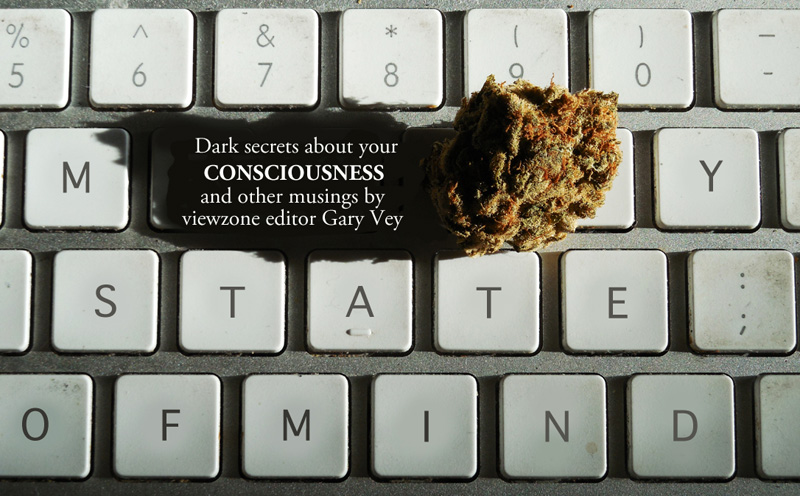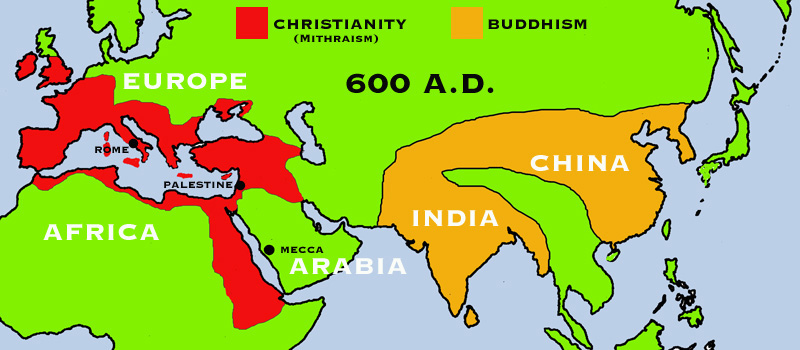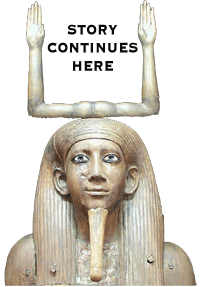
-- Prophet Muhammad (peace and blessings of God be upon him)
Setting the stage for Islam: 600 AD
By 600 AD, just 500 years after the life of Jesus, Europe is in chaos. The original teaching of a fatherly god who promoted brotherly love and compassion has been replaced by a political system with made up doctrines, dogmas, rules and sin, all resulting from Paul's Mithraic influence. Just about everywhere there are wars and conflicts. The citizens live in squalor under the oppression of local kings. Literacy and education are confined to Christian monasteries and the very rich. The original Jesus teachings are all but extinguished by the Vatican. Europe is entering what will be called The Dark Ages.
In Asia, the teachings of Buddha have transformed and unified the people wherever they spread. Three distinct flavors of Buddhism are practiced at this time but all adhere to the Four Noble Truths and the Eightfold Paths.
Without defining a god, Buddhism is practiced alongside the reverence for local deities and traditions. It first supplements, but later replaces the older traditions through its effectiveness. Buddhism continues to spread the promise of reincarnation, the laws of karma and the tranquility that comes from practicing non-attachment. By 600 AD, trade along the famous Silk Road had spread Buddhism all the way to the Pacific.
The benefits of a unified system of belief and of an effective system for regulating the selfish proclivities of consciousness were being felt in both Europe and Asia. Left out of this progress was the desert land between -- the Arabian Peninsula (see the map below).

The Arabian culture was not much different from that of the bicameral days. Each family was part of a tribe and each tribe had its own leader and religious idol. Tribes fought constantly in this arid land, usually over water rights or to avenge some wrong. It was a chaotic time similar to the era when Abraham lived, thousands of years earlier.
In Arabia, the surrounding tribes kept their unique idols in a small square temple called the kaba (remember "ka" and "ba" from Egyptian psychology?). The temple was located inside a special "no weapon" zone where the idols were free from attack or vandalism. This safe zone became the busy market city of Mecca. The temple is believed to have been built by Abraham and his first son, Ishmael, and it was considered an honor to have one's tribal idol housed there.

An exceptional man named Mohammed (born about 570 AD) spent much time in this market listening and conversing with the traveling merchants who came from both the East and West. He learned about the religious beliefs of the Hebrews, Christians, Hindus and Buddhists. He became determined to know which was true.
Mohammed eventually claimed to have been visited by an angel (Gabriel) who recited certain truths to him. He quickly revealed these things to his family and friends who believed that Mohammed was a prophet. His oral revelations were eventually written down and are contained in the book called the Quran.
Acting on instructions from the voice, Mohammed destroyed all of the hundreds of idols inside the kaba and established his family's own deity, the Moon god, as the one and only god, Allah.
The Quran contains narrations that resemble those in the Old Testament, as well as a series of laws which outline correct conduct in all aspects of life, both public and private. Because these laws were originally designed to civilize the Bedouins of the 6th Century, they were harsh and had severe consequences if violated.
Mohammed and Abraham (Allah and Yahweh)
There are striking similarities between Mohammed and Abraham, and especially between their god, Allah and Yahweh. That they are the same deity is deduced by the name revealed to Moses, "Yahweh". This is the same deity that spoke earlier to Abraham (Mohammed's ancestor). Because there is "only One God and His name is Allah", He (Allah) must be the same One God of Abraham and Moses (Yahweh).
Both Abraham and Mohammed claimed to hear the "voice" and messengers from Yahweh. Both sought to enforce their beliefs through force and violence. Both instituted a system of laws that regulated morality and the conduct of daily life through the fear of punishment. Both were monotheistic and their deity, Yahweh, was deficient in love.
Undoubtedly, Mohammed must have learned much about the Yahweh traditions from the Jewish merchants that visited Mecca. He revealed Allah to be much more than the Moon god of his tribe. Allah was the supreme god who demanded respect and worship and, like the god of Abraham, Allah could be angry and punish bad conduct or could reward those who pleased him. Like Yahweh, Allah was narcissistic and adept at deception.
"Verily, the hypocrites seek to deceive Allah, but it is He Who deceives them. And when they stand up for As-Salat (the prayer), they stand with laziness and to be seen of men, and they do not remember Allah but little." (S. 4:142 Hilali-Khan)
"And (the unbelievers) schemed and planned, and Allah schemed also, and the best of schemers is Allah." (S. 3:54)
Departing from the Jewish beliefs, the Quran denies reincarnation. Instead Islam borrows the idea of heaven from the Christian-Mithras cult. According to the Quran, heaven is an actual place that already exists, since Adam and Eve were placed in it during their days of innocence. In Sura 55 of the Quran it is revealed that there are two "High Heavens" -- one for the humans and one for the jinns (angel like spirit beings) -- and two "Lower Heavens" -- one for the humans and one for the jinns.
Quran 55:54:- [They are] reclining on beds whose linings are of silk brocade, and the fruit of the two gardens is hanging low.
Quran 56:12-24:- In the Gardens of Pleasure, A [large] company of the former peoples, And a few of the later peoples, On thrones woven [with ornament],Reclining on them, facing each other.There will circulate among them young boys made eternal With vessels, pitchers and a cup [of wine] from a flowing spring -- No headache will they have therefrom, nor will they be intoxicated -- And fruit of what they select And the meat of fowl, from whatever they desire. And [for them are] fair women with large, [beautiful] eyes, The likenesses of pearls well -- protected,As reward for what they used to do.
Quran 76:21:- Upon the inhabitants will be green garments of fine silk and brocade. And they will be adorned with bracelets of silver, and their Lord will give them a purifying drink.
Quran 78:31-34:- Indeed, for the righteous is attainment -Gardens and grapevines And full-breasted [companions] of equal age And a full cup.
Like the Christians, who believe in a judgement day, Hell will be created on that Day of Judgement and will also consist of the familiar fire and brimstone (S. 69:17 & 89:23).
Quran 74: 26-29:- I will cast him into Hell-fire, And what will make you know exactly what Hell-fire is? It spares not (any sinner), nor does it leave (anything unburnt)!Burning the skins!
Islam: The Benefits to Civilization
Islam obliges that a believer should pay respect by praying to Allah five times a day. During each visit to the mosque, or anywhere while facing the kaba in Mecca, Muslims reaffirm their belief in Allah and ask that their conduct be correct, according to the laws in the Quran.
"In the name of Allah, Most Gracious, Most Merciful. Praise be to Allah, Lord of the Worlds. Most Gracious, Most Merciful. Master of the Day of Judgment. Thee (alone) we worship and Thee (alone) we ask for help. Show us the straight path. The path of those whom Thou hast favoured; Not the (path) of those who earn Thine anger nor of those who go astray." (1:1-1:7)
This repeated act encouraged Muslims to gather together in the mosque as like minded brothers, and allowed the opportunity for men to socialize and exchange ideas. As Islam expanded to the surrounding tribes, then to surrounding nations, the obligatory visits to Mecca became an international melting pot of worship and a place where discoveries and theories were made known. It became the beginning of what we now know as science and scholarship.
The mosques became what the Christian monasteries failed to be: vibrant centers for intellectuals, artists, and mathematicians. Mosques were the schools and hospitals that offered their services universally. It is no exaggeration to say that without Islam's critical influence on the world you probably would not be using a computer right now.
As a solution to consciousness...
Mortality salience (the fear of death) is mitigated quite effectively in Islam by describing a life after death that has great appeal to the material senses. There are (for the men) beautiful women, great landscapes and excellent dining. In fact, there are a couple of heavens where you might end up, but even the least of them is exquisite. All that is required for admission is belief in Allah as the One God and that Mohammed is his prophet. The last bit includes adhering to all of the laws (sharia) that the Prophet gave to his followers.
The subjective self is pretty much left unmolested except that it eventually is modified by prayer and the recitation of the Quran passages. Islam tries to control the negative self-interests of consciousness by imposing specific laws with dire consequences that elicit fear. There is little emphasis on understanding why some acts are right and some are not. There is no underlying motivation being examined and addressed on a personal level (i.e. a universal explanation such as love or selfishness). Like in the days of the old bicameral voice, one does not think. One only obeys.
Although Islam is open to anyone, and is very universal, the discrimination against non-believers, infidels, has shed as much blood as the Christian Inquisition and the Crusades. Its greatest appeal is to the forgotten people, the people who have been subject to discrimination and oppression and excluded or marginalized by other faiths. Islam offers any man with no hope the opportunity to feel part of a brotherhood with fellow believers of his god, Allah.
If you do not believe, woe to you.
Because Islam is not capable of moderating its dogmatic beliefs, as they are indelibly written in the Quran, it has been set on a collision course with so-called Western civilization, based largely on Christian (Mithraic) values and social awareness. It's rigid obedience to the written law and failure to emphasize compassion for non-believers falls short of a stable or enduring solution to the negative problems of consciousness.
If I refrain from stealing because I fear getting my hands chopped off, and if I do not commit adultery because I fear getting stoned to death, then I am not truly moral. Similarly, if I keep my faith because I know that infidels are hung, then mine is not a sincere faith. Unless I understand that my actions have consequences that may harm others or myself, I do not have morality.
This self-less way of assessing the consequences of action was originally taught by Buddha and Jesus. It is unfortunately lacking in Islam. Despite its shortcomings, the teachings of Mohammed are practiced by more than 1.6-billion people today.
What kind of God do you want?

Above: You're looking at a very small piece of the night sky that, if not seen through the Hubble telescope, would look dark and void. But it's not. It's full of massive galaxies with so many suns and planets that the number is unimaginable. This is the universe in its grand scale, and the place where we find ourselves living right now.
We know a lot more about the size and scope of this universe than was known back when Jesus or Mohammed were alive. Our idea of what we must attribute to the Creator -- the One God -- must also expand. That's where I am going next with this story. Thank you always for your comments and thoughts.
[inhale] later...
